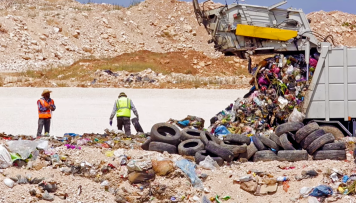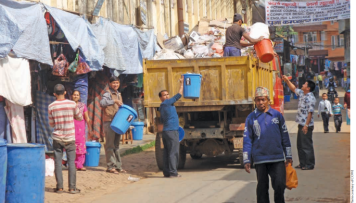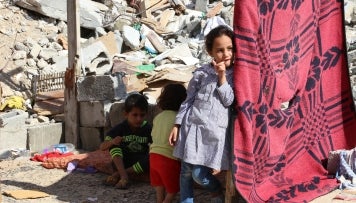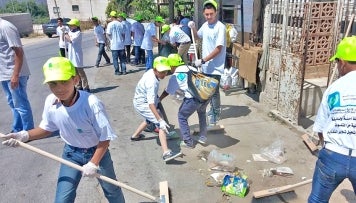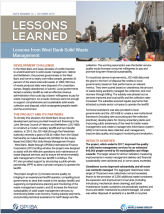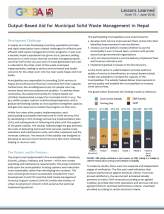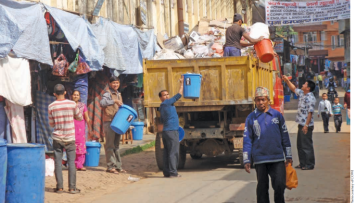
Photo: Peter Kapuscinski / World Bank
Incentives for Cleaner Cities in Nepal
Cities across Nepal— and in the developing world— produce more waste than ever before, due to a spike in population and a surge in new economic activity and urbanization. Properly disposing and managing solid waste has thus become urgent for city municipalities.
Although collecting, storing and recycling solid waste can represent up to 50 percent of a municipality’s annual budget, many local governments don’t collect enough revenue from waste management services to cover these costs.
As a result, landscapes and public spaces in Nepal’s urban centers are deteriorating. Less than half of the 700,000 tons of waste generated in Nepal’s cities each year is collected. Most waste is dumped without any regulation or oversight and several municipalities do not have a designated disposal site, leading to haphazard disposal of waste -- often next to a river-- further aggravating the problem.
With rising urbanization, the costs of inaction are piling up and compromising people’s health and the environment. In most cases, the poor suffer the most from the resulting negative economic, environmental, and human health impacts.
New financing approaches help clean up Nepal’s cities
Thanks to an innovative approach to fund solid waste management (SWM), five cities across Nepal are transforming the way they manage solid waste while generating income from it.
Dhankuta’s streets was once littered with trash; now, due to trash cans placed at intervals, a landfill site and application of vermicomposting techniques, it was named the cleanest city in Nepal.
In Pokhara, opening up waste management to private sector participation led to benefits for almost 50,000 households, approximately 16 percent of the population.
In Ghorahi and Tansen, household level recycling and composting is keeping the cities remarkably clean.
And in Lalitpur, the sub-metropolitan city in Kathmandu, the collection of solid waste fees by the city increased by 400 percent.

Incentives for better waste management
For the past four years, the World Bank has helped these five cities achieve these remarkable results through a US$4.3 million results-based grant scheme developed by the Global Partnership on Output-based Aid (GPOBA). The scheme was structured around a five-year incentive-based subsidy approach, providing effective incentives for service providers to reach underserved low-income communities and ultimately linking funding to actual results achieved.
In Nepal, GPOBA’s incentive-based approach tackled two problems related to waste management: the ineffective collection of solid waste management fees and the missed opportunity for managing solid waste sustainably.
The scheme solved this by bridging the gap between the cost of delivering improved SWM services, such as capital costs and operations and maintenance costs, and the revenues that municipalities can collect for these services.
The amount of the subsidy is designed to decrease over time, as services improve and fee collection increases to contribute toward final cost recovery. Implicit in this design is the assumption that residents’ willingness-to-pay increases as they witness visible improvements in service coverage and delivery.
The opportunity for Results-based Financing in Solid Waste Management
Results-based financing (RBF) has now been applied globally across the SWM value chain. Our recent GPOBA study shows that results-based schemes can be applied to:
- Improve solid waste and fee collection service delivery
- Promote environmental-friendly practices, particularly source separation and recycling
- Strengthen waste collection and transport in under-served communities
The complementarity between the GPOBA results-based approaches and the World Bank’s “Program for Results” instrument provide an additional opportunity for collaboration that could bring pilot approaches to scale, in areas such as the establishment of meaningful disbursement linked indicators and verification systems.
Mobilizing private capital and expanding impact investing
As they do with infrastructure development, results-based capital grants or concessional loans could reduce the risk to investors and provide incentives to public or private service providers, utilities, or city authorities to extend solid water management services to poor households or communities by subsidizing the cost of the service received, thus encouraging operators to enter markets they would otherwise not find profitable.
Cleaner cities draw investment and tourists, which creates jobs and new business opportunities. But most of all, when done right, solid waste management makes a real difference in the lives of poor familes and can help countries achieve their development goals.
GPOBA’s success in Nepal—as well as a similar success in the West Bank—raises the exciting prospect that scaling up RBF approaches in other countries dealing with solid waste management challenges could deliver similar benefits to cities worldwide.
Related:
